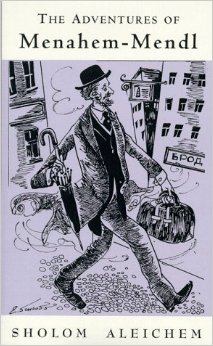 Sholom Aleichem (Solomon Naumovich Rabinovich) 1859-1916
Sholom Aleichem (Solomon Naumovich Rabinovich) 1859-1916
In February we feature the well-known writer whose stories about Menakhem
Mendel were the basis for the Soviet film, Jewish Luck. This film along with Vera’s use of the term “Jewish luck” prompted us to also title our book, Jewish Luck. Mosfilm changed Sholom Aleichem’s storyline to conform to Soviet propaganda, but it’s clear why Marxist ideologues thought a Sholom Aleichem story would draw the Jewish population to the theater. He was popular and he was funny. You may have heard him called the “Jewish Mark Twain.” When Mark Twain heard the comparison, in response, he styled himself, “the American Sholom Aleichem.”
Sholom Aleichem’s economic circumstances were tenuous. At times, his family was relatively prosperous, at other times, they lost everything. Illness stalked the family and following the pogroms of 1905, he left for the United States along with millions of other Russian Jews. Sholom Aleichem discovered there was an audience for his work in the United States and he continued to write in multiple genres. Although he wrote in both Hebrew and Russian, he is most well-known for his Yiddish works. He wrote in Yiddish vernacular to capture the experiences of common Jews and he paints the portraits with humor. In 1964 when the Broadway play Fiddler on the Roof (Bock and Harnick) introduced Sholom Aleichem to a new audience, they were captivated.
Most Americans know Tevye the Dairyman from the play, but we suggest if you haven’t met Menakhem Mendel whom Sholom Aleichem created in 1887, you should. We read The Adventures of Menahem Mendel translated by his granddaughter, Tamara Kahana, and published by Putnam in 1969. Menakhem Mendel is always trying a new scheme to make a living. Of course, the Soviet take is that with the rise of the communist state, Jews could refocus from their perennial concerns with parnasa, making a living, and the State would provide. The anti-Semitism of the tsarist regimes would disappear in the enlightened socialist state. The film, Jewish Luck, is propaganda and not history. Even the reformatting of the story to suit communist censors couldn’t completely eliminate the verve of Menakhem Mendel. Sholom Aleichem died before the film was produced but he lived long enough to guess the end of the story of the Bolshevik Revolution.
To learn more about Sholom Aleichem, you can view Joseph Dorman’s documentary film Laughing in the Darkness. See a clip at sholemaleichemthemovie.com
And why read Sholom Aleichem in order to write the stories of two Jewish women born in the late 1950s? He asks the same question as Vera and Alisa—
How should we be Jews in this modern world?